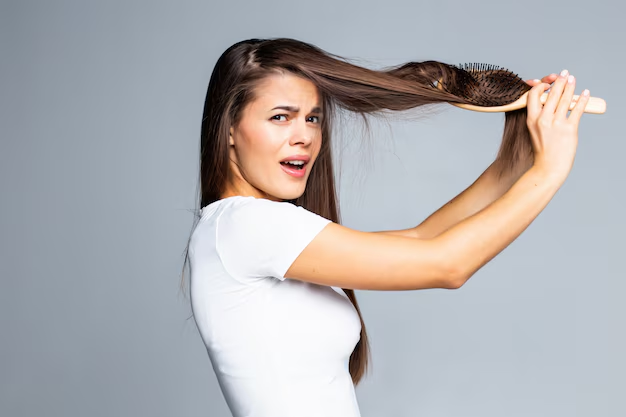Understanding Hair Loss: Causes, Prevention, and Symptoms

Understanding Hair Loss: Causes, Prevention, and Symptoms
Introduction
Hair loss is a widespread issue affecting millions globally, with significant emotional and psychological impacts. Whether it arises from genetic predisposition, lifestyle choices, or underlying health conditions, hair loss can undermine self-esteem and quality of life. This guide delves into the multifaceted nature of hair loss, exploring its causes, prevention strategies, and potential links to serious health conditions. Additionally, we will address common myths, such as the role of dry hair and inadequate nourishment.
What Is Hair Loss?
Hair loss, or alopecia, encompasses the shedding of hair from the scalp or other body parts. It ranges from mild thinning to complete baldness and can manifest gradually or suddenly. Hair loss may affect the entire scalp or be localized to specific areas. Understanding the underlying causes of hair loss is crucial for effective management and treatment.
Causes of Hair Loss
Genetics and Heredity
- Androgenetic Alopecia: Often referred to as male-pattern baldness or female-pattern baldness, this type of hair loss is hereditary. It results from a combination of genetic factors and hormonal changes, leading to progressive thinning over time. Men typically experience receding hairlines and thinning at the crown, while women generally experience diffuse thinning across the scalp.
- Family History: A familial tendency towards hair loss increases the likelihood of experiencing similar issues. This hereditary predisposition plays a significant role in determining who will develop androgenetic alopecia.
Hormonal Changes
- Thyroid Disorders: Both hypothyroidism (underactive thyroid) and hyperthyroidism (overactive thyroid) can lead to hair loss. The thyroid gland regulates various bodily functions, including metabolism and hair growth. Imbalances in thyroid hormones can disrupt the hair growth cycle, resulting in thinning or shedding.
- Pregnancy and Childbirth: Postpartum alopecia is a temporary hair loss condition experienced by many women after giving birth. Hormonal fluctuations during pregnancy and childbirth can trigger this type of hair loss, which generally resolves on its own within a few months.
Medical Conditions
- Autoimmune Diseases: Alopecia areata is an autoimmune condition where the immune system mistakenly attacks hair follicles, causing hair loss. It can lead to patches of baldness on the scalp or other body areas and may sometimes progress to complete baldness.
- Scalp Infections: Fungal infections, such as ringworm, can cause hair loss by damaging the scalp and hair follicles. Proper treatment of these infections is essential to restore hair growth.
Nutritional Deficiencies
- Iron Deficiency: Iron deficiency anemia can lead to hair loss as iron is critical for healthy hair growth. Low iron levels disrupt the hair growth cycle, causing thinning and shedding.
- Vitamin Deficiencies: Essential vitamins such as Vitamin D, B12, and biotin play crucial roles in maintaining hair health. Deficiencies in these nutrients can contribute to hair thinning and loss.
Lifestyle Factors
- Stress: Chronic stress can trigger hair loss by disrupting the normal hair growth cycle. Conditions like telogen effluvium result from prolonged stress, leading to excessive shedding. While stress-related hair loss is often temporary, persistent stress can have more severe effects.
- Poor Diet: A diet lacking in essential nutrients can negatively impact hair health. Insufficient protein, vitamins, and minerals weaken hair and contribute to thinning. Maintaining a balanced diet is crucial for sustaining healthy hair.
Medications and Treatments
- Medications: Certain medications, including chemotherapy drugs, blood thinners, and antidepressants, may cause hair loss as a side effect. Chemotherapy, for instance, targets rapidly dividing cells, including hair follicles, leading to temporary or permanent hair loss.
- Medical Treatments: Treatments like radiation therapy can impact hair growth, leading to hair loss in the treated areas. Temporary hair loss may occur, with regrowth expected after the completion of treatment.
Physical Trauma
- Scalp Injury: Injuries to the scalp, such as burns or trauma, can damage hair follicles, resulting in localized hair loss. Proper care and treatment of the injured area are necessary to support hair regrowth.
- Hair Treatments: Excessive use of harsh hair treatments, such as chemical relaxers, dyes, and heat styling, can weaken hair and lead to breakage and thinning. Adopting gentler hair care practices can help mitigate these effects.
Preventing Hair Loss
Healthy Diet and Nutrition
- Balanced Diet: Consuming a diet rich in proteins, vitamins, and minerals supports hair health. Incorporate lean meats, fish, leafy greens, nuts, and seeds to ensure adequate nutrient intake.
- Supplements: If necessary, consider supplements such as biotin, iron, and Vitamin D. However, consult with a healthcare provider before starting any new supplements to ensure they are appropriate for your needs.
Stress Management
- Relaxation Techniques: Practice stress-relief techniques like meditation, yoga, and deep breathing exercises to manage stress and reduce its impact on hair health.
- Healthy Lifestyle: Engage in regular physical activity and maintain a balanced work-life routine to minimize stress levels and support overall well-being.
Proper Hair Care
- Gentle Hair Care: Use mild shampoos and conditioners suitable for your hair type. Avoid excessive heat styling and harsh chemical treatments that can damage hair.
- Avoid Tight Hairstyles: Refrain from hairstyles that pull tightly on the hair, such as ponytails and braids, as they can cause traction alopecia, a type of hair loss resulting from mechanical stress on the hair.
Medical Consultation
- Seek Professional Advice: If you experience significant hair loss or have concerns about underlying health conditions, consult a dermatologist or healthcare provider for an accurate diagnosis and treatment plan.
Is Hair Loss a Symptom of a Disease?
Hair loss can sometimes indicate an underlying health issue. Conditions such as thyroid disorders, autoimmune diseases, and hormonal imbalances can lead to hair thinning and loss. If hair loss is accompanied by additional symptoms like fatigue, weight changes, or skin issues, it’s essential to seek medical evaluation to rule out or address potential health concerns.
Age and Hair Loss
Hair loss does not adhere to a specific age criterion. While genetic factors often lead to hair loss later in life, younger individuals can also experience hair thinning due to stress, nutritional deficiencies, and medical conditions. Early intervention and proper care are crucial for managing and potentially mitigating hair loss at any age.
Conclusion
Hair loss is a complex issue with various causes ranging from genetic predisposition and hormonal changes to lifestyle factors and medical conditions. Understanding these causes, adopting preventive measures, and seeking professional advice can help manage and address hair loss effectively. Whether you are experiencing hair loss yourself or are concerned about someone else, taking proactive steps to maintain hair health and seek appropriate treatment can make a significant difference.
By addressing the underlying causes of hair loss and implementing strategies for prevention and care, you can support healthy hair growth and improve overall well-being. If you have any concerns about your hair loss or related symptoms, consult with a healthcare provider to explore the best course of action tailored to your specific needs.




